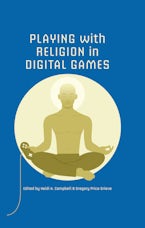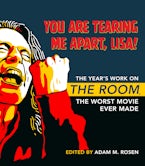- Home
- Digital Game Studies
- Playing with Religion in Digital Games
Preparing your PDF for download...
There was a problem with your download, please contact the server administrator.
Playing with Religion in Digital Games
Edited by Heidi A. Campbell and Gregory P. Grieve
Contributions by Oliver Steffen, Peter F. Likarish, Brenda S. Gardemour Walter, Nathan Abrams, Xenia Zeiler, Jason Anthony, Vit Sisler, Michael Waltemathe, Kevin Schut, Shanny Luft, Rachel Wagner and Rabis Gregory
Published by: Indiana University Press
304 Pages, 7 b&w illus., 3 tables
- eBook
- 9780253012630
- Published: April 2014
$9.99
Other Retailers:
Shaman, paragon, God-mode: modern video games are heavily coded with religious undertones. From the Shinto-inspired Japanese video game Okami to the internationally popular The Legend of Zelda and Halo, many video games rely on religious themes and symbols to drive the narrative and frame the storyline. Playing with Religion in Digital Games explores the increasingly complex relationship between gaming and global religious practices. For example, how does religion help organize the communities in MMORPGs such as World of Warcraft? What role has censorship played in localizing games like Actraiser in the western world? How do evangelical Christians react to violence, gore, and sexuality in some of the most popular games such as Mass Effect or Grand Theft Auto? With contributions by scholars and gamers from all over the world, this collection offers a unique perspective to the intersections of religion and the virtual world.
Introduction: What Playing with Religion Offers Digital Game Studies / Heidi A. Campbell and Gregory Price Grieve
Part 1: Explorations in Religiously Themed Games
1. Dreidels to Dante's Inferno: Toward a Typology of Religious Games / Jason Anthony
2. Locating the Pixelated Jew: A Multimodal Method for Exploring Judaism in The Shivah / Isamar Carrillo Masso and Nathan Abrams
3. The Global Mediatization of Hinduism through Digital Games: Representation versus Simulation in Hanuman: Boy Warrior / Xenia Zeiler
4. Silent Hill and Fatal Frame: Finding Transcendent Horror in and beyond the Haunted Magic Circle / Brenda S. Gardenour Walter
Part 2: Religion in Mainstream Games
5. From Kuma\War to Quraish: Representation of Islam in Arab and American Video Games / Vit Šisler
6. Citing the Medieval: Using Religion as World-Building Infrastructure in Fantasy MMORPGs / Rabia Gregory
7. Hardcore Christian Gamers: How Religion Shapes Evangelical Play / Shanny Luft
8. Filtering Cultural Feedback: Religion, Censorship and Localization in Actraiser and Other Mainstream Video Games / Peter Likarish
Part 3: Gaming as Implicit Religion
9. The Importance of Playing in Earnest / Rachel Wagner
10. "God Modes" and "God Moods": What Does a Digital Game Need to Be Spiritually Effective? / Oliver Steffen
11. Bridging Multiple Realities: Religion, Play and Alfred Schutz's Theory of the Life-World / Michael Waltemathe
12. They Kill Mystery: The Mechanistic Bias of Video Game Representations of Religion and Spirituality / Kevin Schuts
Gameography
Contributors
Index
Heidi A. Campbell is Associate Professor of Communication at Texas A&M University, where she teaches media studies. She is author of Exploring Religious Community Online and When Religion Meets New Media, and editor of Digital Religion. She is Director of the Network for New Media, Religion, and Digital Culture Studies.
Gregory P. Grieve is Associate Professor in Religious Studies at the University of North Carolina at Greensboro. He is Director of MERGE: A Network for Collaborative Interdisciplinary Scholarship in UNCG's College of Arts and Sciences, and co-chair of the American Academy of Religion's section on Religion and Popular Culture. He is author of Retheorizing Religion in Nepal and editor (with Steven Engler) of Historicizing "Tradition" in the Study of Religion.
"This collection builds on and adds to the best criticism in this young and exciting subfield and will grow more important as religion integrates further into our digital games."
~Library Journal
"...[A]n ambitious and impressive compendium offering intriguing possibilities for further research and theory for the burgeoning field of cultural studies."
~Publishers Weekly
"This fine collection of essays represents a well-documented study of the effects and influences that religion (in general) has had on digital gaming and its players. . . . This volume will be a good launching pad for future research."
~Choice
"This edited collection is uniformly good and well worth reading. As the editors and authors note, the study of religion and gaming stands very near its beginning. They invite others to take up the study and this book offers a good starting point."
~Communication Research Trends
"Games and gods are very old partners, but this book shows they are also on the cutting edge of religious studies today. The editors have assembled a wonderful range of essays that advance the conversation, soar over traditional boundaries, and ought to work like a charm in the classroom. The task of scrutinizing religion in gaming is important because the issues are play, imagination, leisure, and vast sums of capital. If the sacred does not shimmer in the hand-held screens of modern entertainment, then its fire has gone out of the universe—until, of course, it returns in the shape of a dark-caped knight and a gleaming sword"
~David Morgan, Duke University
"This volume brings together the fields of religion studies and game studies in valuable ways. It helps us see the many and complex roles that religion and spirituality can take on within contemporary videogames, and it also explores how the practice of gameplay itself can be a religion-like experience. The many excellent writers included here demonstrate the value of cross-disciplinary approaches to understanding games, and also how digital games have become a key element of contemporary life—in both its sacred and its profane expressions."
~Mia Consalvo, Concordia University
"This volume offers, finally, a space for legitimate discussions on the nature of 'play' within our notions of religious participation or spiritual searching. The greatest benefit of this book is that it highlights how engaging in digital gaming represents new questions about what makes a thing (be it a story, an action, or a symbol) religious."
~Paul Emerson Teusner, RMIT University


